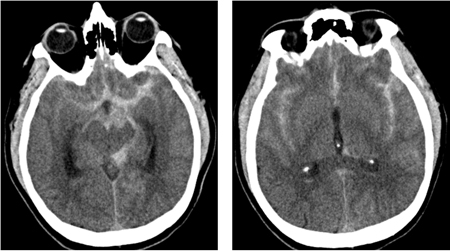Resumo
Definição
História e exame físico
Principais fatores diagnósticos
- presença de fatores de risco
- cefaleia
- fotofobia
- perda de consciência
- paralisia do terceiro nervo craniano
Outros fatores diagnósticos
- idade >50 anos
- sexo feminino
- raça negra
- náuseas/vômitos
- estado mental alterado
- meningismo
- paralisia unilateral ou bilateral do sexto nervo craniano
- hemorragia intraocular
- deficits neurológicos focais
- convulsões
Fatores de risco
- hipertensão
- tabagismo
- história familiar
- doença renal policística autossômica dominante (DRPAD)
- uso de bebidas alcoólicas
- uso de cocaína
- Síndrome de Marfan
- Síndrome de Ehlers-Danlos
- pseudoxantoma elástico
- neurofibromatose do tipo I
Investigações diagnósticas
Primeiras investigações a serem solicitadas
- tomografia computadorizada (TC) do crânio
- Hemograma completo
- coagulograma
- eletrólitos séricos
- troponina I
- glicose sérica
- eletrocardiograma (ECG)
Investigações a serem consideradas
- punção lombar (PL)
- angiografia digital por subtração (ADS)
- angiotomografia (ATG)
- angiografia por ressonância magnética (ARM)
Algoritmo de tratamento
todos os pacientes
Colaboradores
Autores
Salah Keyrouz, MD, FAHA, FCCM
Professor
Neurology and Neurosurgery
Washington University School of Medicine
St. Louis
MO
Declarações
SK is an author of a reference cited in this topic.
Agradecimentos
Dr Salah Keyrouz would like to gratefully acknowledge Dr Michael N. Diringer, a previous contributor to this topic.
Declarações
MND is an author of a number of references cited in this topic.
Revisores
Venkatesh Aiyagari, MD
Associate Professor
Department of Neurology and Rehabilitation
University of Illinois at Chicago
Chicago
IL
Declarações
VA declares that he has no competing interests.
Peter Martin, MA, BM BCh, MD, FRCP
Consultant Neurologist
Addenbrookes Hospital
Cambridge
UK
Declarações
PM declares that he has no competing interests.
Giovanni Grasso, M.D., PhD
Aggregate Professor of Neurosurgery
Neurosurgical Clinic
Department of Clinical Neuroscience
University of Palermo
Palermo
Italy
Declarações
GG declares that he has no competing interests.
Créditos aos pareceristas
Os tópicos do BMJ Best Practice são constantemente atualizados, seguindo os desenvolvimentos das evidências e das diretrizes. Os pareceristas aqui listados revisaram o conteúdo pelo menos uma vez durante a história do tópico.
Declarações
As afiliações e declarações dos pareceristas referem--se ao momento da revisão.
Referências
Principais artigos
Thompson BG, Brown RD Jr, Amin-Hanjani S, et al. Guidelines for the management of patients with unruptured intracranial aneurysms: a guideline for healthcare professionals from the American Heart Association/American Stroke Association. Stroke. 2015 Aug;46(8):2368-400.Texto completo Resumo
Hoh BL, Ko NU, Amin-Hanjani S, et al. 2023 Guideline for the management of patients with aneurysmal subarachnoid hemorrhage: a guideline from the American Heart Association/American Stroke Association. Stroke. 2023 Jul;54(7):e314-70.Texto completo Resumo
Steiner T, Juvela S, Unterberg A, et al. European Stroke Organization guidelines for the management of intracranial aneurysms and subarachnoid haemorrhage. Cerebrovasc Dis. 2013 Feb 7;35(2):93-112.Texto completo Resumo
Artigos de referência
Uma lista completa das fontes referenciadas neste tópico está disponível para os usuários com acesso total ao BMJ Best Practice.

Diagnósticos diferenciais
- Hemorragia subaracnoide (HSA) perimesencefálica não aneurismática
- Dissecção arterial
- Malformação arteriovenosa (MAV) cerebral e cervical
Mais Diagnósticos diferenciaisDiretrizes
- Guidelines for the management of aneurysmal subarachnoid hemorrhage: a guideline for healthcare professionals
- Guidelines for the management of neurocritical care management of aneurysmal subarachnoid hemorrhage
Mais DiretrizesFolhetos informativos para os pacientes
Hemorragia subaracnoide
Mais Folhetos informativos para os pacientesVideos
Punção lombar diagnóstica em adultos: demonstração animada
Intubação traqueal - Vídeo de demonstração
Mais vídeosConectar-se ou assinar para acessar todo o BMJ Best Practice
O uso deste conteúdo está sujeito ao nosso aviso legal